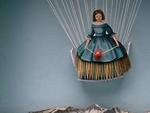Joseph Cornell
dal 27/4/2007 al 18/8/2007
Segnalato da
27/4/2007
Joseph Cornell
PEM Peabody Essex Museum, Salem
Navigating the Imagination

Navigating the Imagination
Featuring 180 works, the exhibition is co-organized by the Peabody Essex Museum and the Smithsonian American Art Museum. It presents new insights into this fascinating artist, illuminating the richness of the ideas he explored across all media. Navigating the Imagination includes the artist’s finest box constructions, collages, dossiers, films and graphic designs from public and private collections––more than 30 on public view for the first time. Seven of the collages in the show were donated to the Peabody Essex Museum by The Joseph and Robert Cornell Memorial Foundation. Lynda Roscoe Hartigan, chief curator of the Peabody Essex Museum, and a widely published scholar on Cornell, is curator of Navigating the Imagination.
"Joseph Cornell was an extraordinary artist whose work will capture the interest and imagination of all who see it. While self-taught, he was among the most influential artists of the 20th century and his work is renowned for fusing art, culture, and history into remarkable experiences,” says Dan Monroe, Executive Director and CEO of the Peabody Essex Museum.
Cornell’s art is often associated with surrealism, an art movement that reinterpreted the meaning of ordinary objects by rearranging or presenting them in surprising and unexpected ways. But as Hartigan notes, “surrealism was just one of the many resources that Cornell called upon as an artist driven by innate curiosity and creativity rather than by theories and formal art training. His interpretations of traditions and ideas were as diverse as celestial navigation, ballet and Renaissance art and culture.” He said his works were based on everyday experiences, “the beauty of the commonplace.”
In the early 1930s, Cornell (1903–1972) created his first collages, boxes and experimental films. Soon after, he had his first solo exhibition in New York City, where he continued to show throughout his career. In 1940, his boxes contained found materials artfully arranged, then collaged and painted to suggest poetic associations that drew on the arts, humanities and sciences. In the 1940s and 1950s, he made some of his most memorable and compelling boxes, including the “Medici,” “Aviary,” “Hotel” and “Observatory” series, as well as boxes devoted to stage and screen personalities. In the 1950s and 1960s Cornell’s experimental films and lyrical collages provided new territory for his ideas and also prefigured the concept of appropriation–-the use of borrowed elements in the creation of new works–-favored by many artists since the 1980s. His impact has been felt by artists such as Andy Warhol and Robert Rauschenberg, experimental filmmakers Rudy Burckhardt and Stan Brakhage, and poets Octavio Paz and Charles Simic, among many others.
The exhibitionis organized thematically to suggest for the first time Cornell’s understanding of the imagination as an “echo chamber” or “mirror of the mind.” As Hartigan says, "Cornell's ability to reinterpret traditions and suggest connections between disparate experiences relates to fundamental concepts of creativity as a path to discovery. It also contributes to the highly poetic character of his intimate, universally appealing work." Unlike previous chronological presentations, the exhibition mingles Cornell’s series and media across four decades of his career to convey the conceptual and formal cohesiveness of his body of work. This approach emphasizes Cornell’s perception of art as a means of creating and communicating connections and possibilities through repetition and variation. This is also is the first time that his films and a greater range of his collages are being shown in the company of the box constructions for which he is best known.
Joseph Cornell: Navigating the Imagination is presented in 10 sections. “Navigating a Career” provides an overview of Cornell’s evolution as an artist from 1931 to 1972. “Wonderland” introduces visitors to his studio environment and working processes. The following sections—“Cabinets of Curiosity,” “Dream Machines,” “Nature’s Theater,” “Geographies of the Heavens,” “Bouquets of Homage,” “Crystal Cages” and “Chambers of Time”—each represent a particular recurring idea or theme explored by the artist. “Movie Palace,” which features a selection of Cornell’s collage films, is based on digital images of the original 16mm films, which are intended to be projected on a larger scale.
Joseph Cornell: Navigating the Imagination travels to the San Francisco Museum of Modern Art (Oct. 6, 2007—Jan. 6, 2008). The exhibition is accompanied by a 48 page catalogue focusing on the artist’s singular way of seeing (April 2007). It includes an essay by curator Lynda Roscoe Hartigan. A second publication, a fully illustrated book written by Hartigan, will be published by Yale University Press later in 2007.
Lynda Roscoe Hartigan will give an illustrated presentation on Joseph Cornell: Navigating the Imagination on May 20th at 2 p.m. For more information on public programs associated with the exhibition, including gallery talks, artist demonstrations, workshops, film screenings, and performances, visit www.pem.org. The exhibition's companion microsite is at www.pem.org/cornell.
Media Preview
A media preview for Joseph Cornell: Navigating the Imagination will be held on Tuesday April 24, 2007. Please RSVP to Colette_Randall @pem.org or call 978-745-9500 x3228.
Credit
Joseph Cornell: Navigating the Imagination is co-organized by the Peabody Essex Museum, Salem, Mass., and the Smithsonian American Art Museum, Washington, D.C., with support from the Henry Luce Foundation, the National Endowment for the Arts, as part of "American Masterpieces: Three Centuries of Artistic Genius," The Mnuchin Foundation, the Ridgestone Foundation and James Corcoran, Los Angeles, and with the cooperation of The Joseph and Robert Cornell Memorial Foundation.
Media Partner: Art New England
PEM Peabody Essex Museum
East India Square - Salem
Hours: daily, 10 a.m. to 5 p.m. The museum is closed Thanksgiving, Christmas, and New Year's Day
Admission: : Adults $13; seniors $11; students $9. Additional admission to Yin Yu Tang: $4. Members, youth 16 and under, and residents of Salem enjoy free general admission and free admission to Yin Yu Tang.



